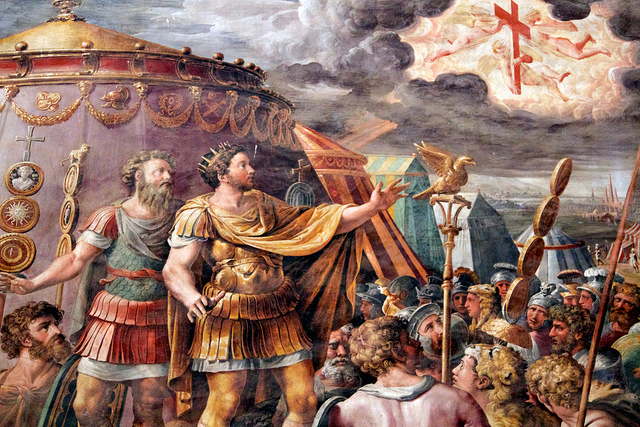There are many different opinions surrounding the conversion of Constantine the Great, the Roman emperor known for reuniting the divided Rome after taking power as the sole emperor of the Roman empire.1 His conversion is said to have taken place sometime after his victory at the Battle of Milvian Bridge in 312 CE, after which he issued the Edict of Milan, allowing Christians in the Roman Empire to openly practice their faith.2 Proving when and whether Emperor Constantine ever converted to Christianity has been a subject for scholarly debate. There are many scholars who present arguments both in favor of and in opposition to the conversion of Constantine. Among these scholars are Edward Gibbon and Thomas G. Elliott. The arguments presented by each of these scholars is unique and convincing in its own way. Gibbon argues that Constantine did convert, while Thomas G. Elliott argues that he did not.3

While both arguments have their merits, Gibbon’s argument is the stronger of the two. I argue that his argument is stronger because it acknowledges the fact that, while the conversion may have had various motives, it still amounted to a conversion. It is possible for Constantine to have converted to Christianity, especially because of the account of his experiences during the Battle of Milvian Bridge; but I also understand that he may have made his decision to convert as an emperor—or even as a commander in war—rather than as a matter of individual faith. Gibbon’s argument is backed by solid evidence for this sentiment, and because of the evidence he presents, I find his claim more convincing.
Edward Gibbon, a supporter of Constantine’s conversion, authored a six-volume series titled The History of the Decline and Fall of the Roman Empire in which he analyzes and dissects important events in Rome’s long history. In Volume 2, Gibbon addresses the issue of Constantine’s conversion, and he introduces an interesting perspective about it. To begin his argument, Gibbon notes that Constantine was put in a special position because “the elevation of Constantius to the supreme and independent dignity of Augustus, gave a free scope to the exercise of his virtues” and that Constantius’ ability to establish toleration during his reign gave way for Constantine to “[declare] himself the protector of the church, [and be deserving of] the appellation of the first emperor who publicly professed and established the Christian religion.”4 Gibbon goes on to say that Constantine most likely had motives surrounding his conversion, and says “that every victory of Constantine was productive of some relief or benefit to the church.”5 That quote makes it evident that Gibbon’s argument is as follows: yes, Constantine did convert to Christianity, but he did so as a political move, not as an act of faith.
Gibbon explains that one problem surrounding the question of Constantine’s conversion is the fact that no date for his conversion can be identified, and he qualifies this statement with proof that the writings of several historians including Lactantius, Eusebius, and Zosimus contradict each other by providing different timelines for the conversion.6 Gibbon goes on to point out that as a child, Constantine witnessed the cruelties inflicted on Romans—in both the East and West empires—for expressing their religion, and says that as a result, once Constantine was emperor he “immediately suspended or repealed the edicts of persecution, and granted the free exercise of their religious ceremonies to all those who had already professed themselves members of the church.”7 From this ruling to allow the free expression of faith, the people who lived under Constantine were given reason “to depend on the favor as well as on the justice of their sovereign, who had imbibed a secret and sincere reverence for the name of Christ, and for the God of the Christians.”8 Gibbon is claiming that the fundamental purpose surrounding Constantine’s conversion was politics and power, not personal conviction or divine calling. Gibbon makes it clear that in Constantine’s decision to issue the Edict of Milan and claim his own conversion, he was gaining the trust of the nation he ruled, and was therefore motivated by the chance to not only be an able emperor, but a trusted, loved, and respected one.
In opposition to Constantine’s conversion, author Thomas G. Elliott presents quite an interesting interpretation of the event, and whether or not it really even occurred. Elliott begins his article by noting that, although some believe Constantine became a Christian convert after 312, evidence exists that he was a pagan before 312.9 This introduction already raises questions in the reader’s mind as to whether or not the conversion could have been real, considering that he may have been a pagan for an extended period of time before his sudden conversion. Elliott brings about another controversial idea concerning Constantine’s faith when he mentions that while delivering a panegyric (propaganda speech) in 310, Constantine told his audience that he had “made lavish gifts to a temple of Apollo in Gaul, that in the temple he saw God himself present…[Elliott adds that] scholars had interpreted this to mean that Constantine had professed some sort of Apolline faith…[this being] the strongest indication that Constantine was pagan.”10 Already in these claims, Elliott raises the question of how credible the story of Constantine’s conversion is. But he does not stop there; he goes on to say that “Constantine tailored his statements according to the religion of his audience,” and he gives the example that in 324 Constantine sent two different version of the same letter to the church and to the general public, so as to please both groups.11 In noting this example, Elliott also makes the point that “Constantinian propaganda statements…tells against the view that this material is reliable evidence of the emperor’s personal religious beliefs.”12 Overall, the argument that Elliott makes is based on the fact that any religious professions made by Constantine were simply political propaganda used to turn the people in his favor, and that he did not convert to Christianity.
In my opinion, Edward Gibbon’s argument is more convincing, and I agree with his more than with that of Thomas Elliott. I argue that Constantine did convert to become a Christian, and the evidence that Gibbon provides gives me sufficient reason to assert Constantine’s conversion; it has also given me more insight as to when and why the conversion happened. Gibbon brings up great points in acknowledging that Christianity was probably prevalent in Constantine’s life since his childhood, that each of his victories in war was in some way beneficial to the church, and that his acceptance of the Christian faith helped him in his position of power to win over the trust of the Roman people. All of these arguments make plausible Constantine’s conversion as well as the reason for the conversion: political persuasion and power. Gibbon’s argument provides evidence that support the idea of Constantine converting for the sake of his reign as emperor, and therefore have convinced me to find substance in his argument and agree with his stance.
- Jerry H. Bentley, Herbert F. Ziegler, and Heather E. Streets-Salter, Traditons & Encounters: A Brief Global History From the Beginning to 1500, Fourth, vol. 1 (New York: McGraw-Hill Education, 2016), 170-171. ↵
- Jerry H. Bentley, Herbert F. Ziegler, and Heather E. Streets-Salter, Traditons & Encounters: A Brief Global History From the Beginning to 1500, 170-171. ↵
- Edward Gibbon, The History of the Decline and Fall of the Roman Empire, vol. 2, 6 vols. (Penguin Classics; Reprint edition, 1996), 126, 427-428, 433-434; Thomas G. Elliott, “The Language of Constantine’s Propaganda,” Transactions of the American Philological Association (1974-) 120, 349-351. ↵
- Gibbon, The History of the Decline and Fall of the Roman Empire, 126. ↵
- Gibbon, The History of the Decline and Fall of the Roman Empire, 126. ↵
- Gibbon, The History of the Decline and Fall of the Roman Empire, 427-428. ↵
- Gibbon, The History of the Decline and Fall of the Roman Empire, 433. ↵
- Gibbon, The History of the Decline and Fall of the Roman Empire, 434. ↵
- Elliott, “The Language of Constantine’s Propaganda,” 349. ↵
- Elliott, “The Language of Constantine’s Propaganda,” 349. ↵
- Elliott, “The Language of Constantine’s Propaganda,” 50. ↵
- Elliott, “The Language of Constantine’s Propaganda.”, 351. ↵



53 comments
Samuel Vega
Victoria, you methodically presented two scholarly opinions on whether Constantine converted to Christianity or not. You stated you agreed with Gibbon’s position and provided evidence to support your agreement. In the opposing view you referenced Elliott with some evidence to give the reader the opposing argument. I thought you did a good job presenting both arguments and then letting the reader know why you agreed with Gibbon.
Joshua Marroquin
First of all, I wanted to say that this was a very informative article that presented a lot of new knowledge that helped me learn a lot. It is interesting learning the theory behind Constantine conversation. For example, two scholars were presented into this passage and their theory on weather Constantine actually converted into a Christain. Between these two arguments, Gibbon’s argument came out on top since it presented more reasonable evidence on why Constantine converted.
Javier Oblitas
Thank you for this well written article. It was able to grab my attention and hold it throughout the majority of it. I hadn’t known of Constantine’s Conversion, nor of the great scholarly debate that took place because of it. Your use of sources and citation were impeccable. You were unbiased in your research and provided both points very thoroughly! Have a good day! 🙂
Ben Kruck
This is a good article. I think both sides of the argument are true. Did I believe Constantine convert to Christianity? Yes, however, I’m not sure if he stayed true to being a good Christian. I wouldn’t be suspired if Constantine actually converted for political reasons either, but I do believe he did convert at some point in time, though I guess the reason why will always be up to debate.
Enrico Zorzin Onzi
Hello Victoria, the article is very well writing. I believe that you clearly compared both points of view make the understanding easier for the readers. In addition, in the conclusion you added your point of view which can be different from the readers, but it can generate a nice debate about the topic. I did not know about the motives or interests that Constantine had to convert himself or not, maybe it was related to strategy to manage the Roman Empire in the best way possible.
Kayla Braxton-Young
I really enjoyed reading this article. I didn’t know a lot about the subject, but after reading this article, I now know a lot more. This article offered a ton of information and was really well written.This article was one of the first articles I read that had two opposing viewpoints and read like a debate the entire time was this one, and I found it to be quite intriguing.
Seth Roen
Sometimes, greatness is motivated by least than noble means, as most of us like to think. Centuries later and with the truth stretched. Such as you pointed out with Constantine, however, regardless the man’s motives in conventing, he did do great things in his lifetime. More than some of those who came before and after him. I himself still view Constantine in high regard.
Aurora Torres
Great Article! I have read about Constantine being fair with Christian people people never knew that he himself had converted to Christianity. It is possible and go with Gibbon’s argument that he was a some some point he was pagan but converted. I like that in the article you talk about how Constantine recalls when he was young Christians being executed for their religious belief and he didn’t agree with that so once he became Emperor he wanted to change things and let people believe whatever religion they wanted. Also, I believe from reading this article that he must have converted because he talks about all the victory’s he has had was because of God and wants to give Glory to God for what good things has happened. Once cannot be to certain but from the conversations that were written from Gibbon’s have more evidence that Constantine was Christian.
Emily Davey
I had never thought much about the details of the Roman Emperor’s conversions, this was a wonderful introduction into how those might have gone. I agree with your stance, I think Constantine converted as a matter of policy, to protect his people and his empire. Him writing different versions of the same letter to please both parties is the major detail to me, same as it was to you. Very interesting era of Roman history, and one I might look into thanks to this amazingly informative article. Congratulations on your publication!
Trenton Boudreaux
A well written article on a very important event in Christian history. I was always a bit confused on how Emperor Constantine came to be the first Christian Emperor, especially since the legend states he saw a sign in the sky which we can’t prove. One would think that Constantine would follow the example of his predecessors in abusing the Christian community in Rome, but this article reveals why that didn’t happen.